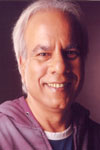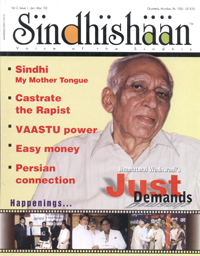“TAKHALUS”
‘calling oneself names’
By Arun Babani

If you are a Sindhi, attracted to things artistic like the literature, poetry and the arts then you must have surely come across these famous names: Rahi, Malhi, Kalpana, Pushp, Wafa, Uttam, Bharati, Mast, Miskeen, Komal, Nirmal, Dukhayal, Diligir, Sikayal and so on. Are these the surnames, pennames or titles of the great personalities, you may ask? None of these; these words, portray the varied emotional and intellectual qualities of the wearer or the bearer, and are known as the Takhalus. There is no parallel word in English for Takhalus, closest being the ‘pen name’ which writers and poets add around their family name. But while a pen name, a western concept, doesn’t bear an emotional quality to its owner, the Takhalus seeks to describe, or even enhance a personality of the poet, thereby giving him a distinct and personal feel.
The tradition of adding a Takhalus to one’s name, in order to define one’s attitude or personal philosophy dates back to olden days of Persian and Arabic literature. The whole of Eastern world, including, Hindi, Sindhi, Parsi, Urdu, Punjabi and Arabic have traditionally used a Takhalus to identify themselves, While some poets see this tradition of adding quality to their names as an attempt to consciously stand for their intellectual beliefs, others put the quality, more for emotional and sentimental reasons.
While some poets select a fact of life, like ‘Rahi’, ‘Musafir’, ‘Sindhi’ or ‘Jeevan’ as their realities, others however, define themselves more as a feelings like `Shaad’, ‘Asha’ or ‘Anand’. Many have chosen a certain negative trait to describe themselves, notable among them are, Pyasi, Ghayal, Laachar, Dard, Udas, Beras, and some have chosen to define themselves in mixed colours. My favourites in this category are `Mohi’ and `Hassid’ both having a shade of Black as well as White feelings!
The sindhi poet prabhu ‘Wafa’, for instance, added ‘wafa’ to his name because, he liked what the word stood for. The quality of loyalty had always appealed to him, he wanted to be truly loyal in all his relationships and as soon as he heard it in an Urdu couplet, he immediately recognised it to be his own nature. And so the Takhalus ‘wafa’ has been with him over six decades and has even helped him mould his character as philosophy of life around it.
Similarly, for the senior poet, Arjan ‘Sikayal’, it was a childhood trait to be full of love, tenderness and beauty. He was schooling in Vth std., when he first fell in love and the feeling of tenderness and power of love gripped him. He wanted to spread this energy of love to everyone or anyone, thereby sharing love and being drowned by love. Thus was born his favourite Takhalus, ‘Sikayal’, which literatrally translates as sika, (Love), yal, (the one). “I am always in love, I’m full of it, I share it wherever I go, and I have always been like this, flowing in love”.
The qualities of love and loyality come easily to poets of all ages and place, as do the quality, ‘Nirmal’, ‘Komal’, Mast’, and ‘Miskeen’.
Vasudev ‘Nirmal’, (the pure one), through his poems as well as his lifestyle has always maintained an honest and clean attitude. Highly respected among the younger generation of poets, Nirmal truly lives upto his image. So does Laxman Komal who has been a pioneer in translating many Indian classics like the works of Mirabai’ and so on, in to Sindhi, and is a fine poet himself. According to many Sindhi intellectuals, ‘Komal’ too has lived upto his Takhalus, which translates as tender, and soft hearted. Tekchand ‘Mast’ and Mirchoo ‘Miskeen’ are some of other poets who give life to their Takhalus by being in character with them.
Late Mohan ‘Kalpana’ was also one writer full of rebellious imagination and is considered the most imaginative writer of children’s stories. I myself once got lost in one of his children’s works and when I came back to reality after closing the book I felt strange but happy. The Novel was ‘Swaraga-Ji-Golah’ (A search for heaven) by Late Shri Mohan ‘Kalpana’. As the title suggest it was a creativity imaginative Novel and made the author dear to all us young Sindhi readers.’ Obviously the Takhalus Kalpana is most suited to such a writer, considered amongst the best in Sindhi’ fiction.
There are a few interesting stories around how certain poets came to choose and keep a certain Takhalus to their names. Shri Holaram Hassija was a writer of ghost stories to begin with. His stories usually started with honeymoon of a newly wed couple far away in a mountain resort and ended with horror tales of murder, deceit and reincarnation. He wrote for a decade and he realized that may be they are not as harmless as they sound, and he switched over to self help books. To write such books, he went through the autobiographies of all the great leaders, saints and philosophers. His pen became mightier than ghosts and he established himself writing popular psychology. During this time a writer friend from Bangalore suggested to Mr. Hassija to keep ‘Hans’ as his Takhalus, as it suited his writing and personality. And so Hollaram Hassija became Hollaram ‘Hans’ and as he says, “it quite fits in with my life style.”
Senior poet Hundraj ‘Dhukhayal’ tells an interesting story around his Takhalus. In his father’s home as a child he recited a few lines from a poem. A sage was living in their house just then and upon hearing the lines of young Hundraj, he said, “This sounds like ‘Dhukhayal’ and so the Takhalus”.
In another context, 15 year old Narain Paryani was migrating to India and asked his friend and mentor Hari Dilgir about a suitable Takhalus. Pat came the reply ‘since you are going to India call yourself Bharati’. And so Narayan Paryani became Narayan Bharati. Interestingly Hari Dilgir sahib has reported to have say that he realized quite late in his life that his Takhalus Dilgir (despair) was not suited to his beliefs. But now it was too late.
Regret or no regret, Takhalus once kept becomes part and parcel of the poet’s personality. He is known more by his Takhalus than by his actual family name and its stays for keeps weather your work or deeds match with it or not.
When I started writing in Sindhi, and searched around for a suitable Takhalus. I was happy during those days and I called myself ‘Swargawasi’. I had heard my master say heaven and hell are not geographical domains, they are inner states. So whenever you are happy creative and silent, you are in heaven! But my mother although she found it fun rejected it saying ``It’s just not done. I am still without Takhalus.
One of the Sindhishaan team members suggested “Betakhalus”.


